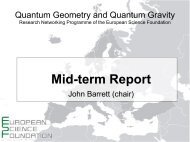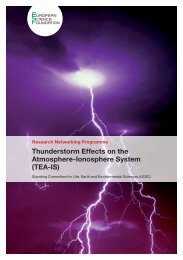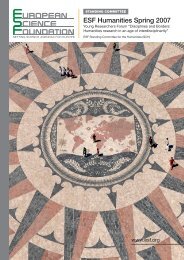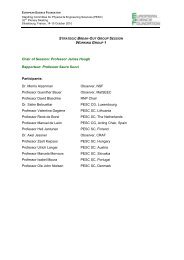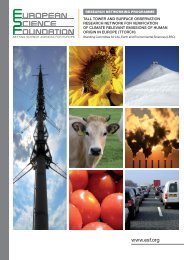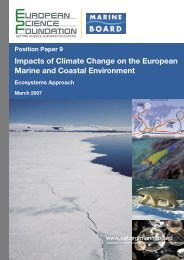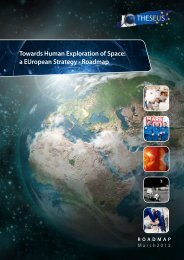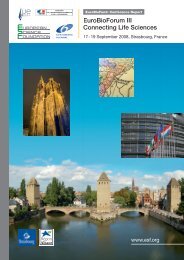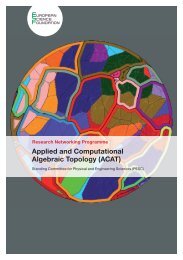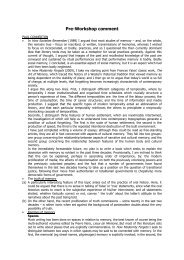Synthesis Report - European Science Foundation
Synthesis Report - European Science Foundation
Synthesis Report - European Science Foundation
You also want an ePaper? Increase the reach of your titles
YUMPU automatically turns print PDFs into web optimized ePapers that Google loves.
14Responses to Environmental and Societal Challenges for our Unstable Earth (RESCUE)or counteracted. This point has been emphasisedin a previous ESF report, The Future of Knowledge:Mapping Interfaces (ESF, 2010), partly drawing uponLloyd (2009). Real-world problems do not conformto disciplinary divides. Large problems call forcontributions from many angles and, very often,complex problems cannot be understood and indeedsolved by one scientific discipline. Global changeresearch is one such field that clearly requires contributionsby academics and practitioners from manydisciplines and sectors.Various terms are used to describe interfaces betweenresearch fields (see Annex 312). While calls forresearch funding often cite ‘interdisciplinarity’ asa desired methodology for large research projects,it may not be clear what is intended, either to theresearch team writing the proposal, or to the reviewersassessing the proposals and teams’ combinedstrengths. In addition, lein Klein (2010) gives an overviewof the different forms of interdisciplinarity inUS universities, varying from informal networks torecognised fields and institutes. The lack of standardand/or uniform definitions across the fundingbodies and research institutions is an issue that mustbe addressed and Annex 3 proposes definitions tobe applied.Cooperative and integrative efforts in globalchange research are nothing new. From early reportsincluding that of the Club of Rome (Meadows etal., 1972; 1992; 2004) onwards, research has combinedthe insights of many disciplines. In nearlyall domains of global change research, the role ofhumans is a key factor as a driving force, a subjectof impacts, or an agent in mitigating impacts andadapting to change. While advances have beenmade in the conceptualisation and practice of interdisciplinaryglobal change research in fields such asclimate change and urban sustainability, approacheshave tended to frame interdisciplinarity as dependingon individual researchers taking the initiative,rather than understanding that complex problemswhich cut across disciplines may require new epistemologicalframeworks and methodological practicesthat exceed any one discipline.A review by RESCUE Collaboration of howthe concept of interdisciplinarity is used by variousresearch organisations for global change researchreveals that there is no consistent and proactivepolicy to further collaboration across disciplines,although there are examples of policy and practice.At the first Global Change Open <strong>Science</strong> Conference12. Based on personal communication from Professor Karl GeorgHøyer (Oslo University College), on definitions in DEA (2008), aswell as on further communication from the RESCUE CollaborationWG and the RESCUE QRG. See also Bhaskar et al. (2010).in Amsterdam in 2001, participants from more than100 countries signed the Amsterdam Declarationon Global Change. This called for a new systemof global environmental science that “(…) willdraw strongly on the existing and expanding disciplinarybase of global change science; integrateacross disciplines, environment and developmentissues and the natural and social sciences” (Mooreet al., 2001). In response, four international globalchange research programmes,13 initiated in the1980s or 1990s, formed the Earth System <strong>Science</strong>Partnership (ESSP)14. Within this partnership, theresearch examines the structure and functioningof the Earth system* including the changes takingplace and their implications for global and regionalsustainability (Leemans et al., 2009). Many othersustainability or development-related projects andintegrated approaches have been put in place in thelast few decades, by academic researchers and teachers,but also by practitioners in the field and by localdevelopment and resources managers. Much hasbeen learned from those too 15. The ‘Future Earth –research for global sustainability’ initiative shouldbe a useful, new step in this matter.Although there are laudable examples ofinterdisciplinary global change research (see, forexample, below) the present situation is not fullyfit for dealing with global change challenges. Onemajor reason is that interdisciplinary global changeresearch is not yet widespread. At most universitiesand other (academic) research institutions, as well asin funding bodies, the monodisciplinary approachhas the upper hand. Furthermore, proponents ofinterdisciplinary global change research at timesrelegate human and social science research to anauxiliary, advisory and essentially non-scientificstatus. Social science and humanities researchshould now feed deeply into global change researchto further our understanding of human-environmentinteraction (Crumley, 2007; Lövbrand et al.2009; ISSC-CIPSH, 2010). This should include scholarsdealing with ethics, culture, religion and legalissues. This would also open up new areas and newways of interdisciplinary collaboration between(already interdisciplinary) global change researchand fields not yet involved. Moreover, interdisciplinarityis too often not integrated from the start. Thenatural, human and social sciences should be inte-13. DIVERSITAS (www.diversitas-international.org),IGBP (www.igbp.net), IHDP (www.ihdp.org), and WCRP(www.wcrp-climate.org)14. www.essp.org.15. See, as starting points, learningforsustainability.net, www.sustainability-literacy.org and vlsearch.org/VLsearch?form=extended&qprev=sustainability



